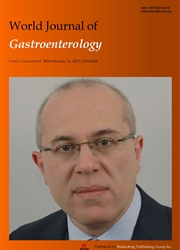

 中文摘要:
中文摘要:
Inflammatory bowel disease(IBD)includes Crohn’s disease and ulcerative colitis.The exact etiology and pathology of IBD remain unknown.Available evidence suggests that an abnormal immune response against the microorganisms in the intestine is responsible for the disease in genetically susceptible individuals.Dysregulation of immune response in the intestine plays a critical role in the pathogenesis of IBD,involving a wide range of molecules including cytokines.On the other hand,besides T helper(Th)1 and Th2 cell immune responses,other subsets of T cells,namely Th17 and regulatory T cells,are likely associated with disease progression.Studying the interactions between various constituents of the innate and adaptive immune systems will certainly open new horizons of the knowledge about the immunologic mechanisms in IBD.
 英文摘要:
英文摘要:
Inflammatory bowel disease (IBD) includes Crohn's disease and ulcerative colitis. The exact etiology and pathology of IBD remain unknown. Available evidence suggests that an abnormal immune response against the microorganisms in the intestine is responsible for the disease in genetically susceptible individuals. Dysregulation of immune response in the intestine plays a critical role in the pathogenesis of IBD, involving a wide range of molecules including cytokines. On the other hand, besides T helper (Th) 1 and Th2 cell immune responses, other subsets of T cells, namely Th17 and regulatory T cells, are likely associated with disease progression. Studying the interactions between various constituents of the innate and adaptive immune systems will certainly open new horizons of the knowledge about the immunologic mechanisms in IBD. (c) 2014 Baishideng Publishing Group Co., Limited. All rights reserved.
 同期刊论文项目
同期刊论文项目
 同项目期刊论文
同项目期刊论文
 Comparative evaluation of intragastric bile acids and hepatobiliary scintigraphy in the diagnosis of
Comparative evaluation of intragastric bile acids and hepatobiliary scintigraphy in the diagnosis of 期刊信息
期刊信息
